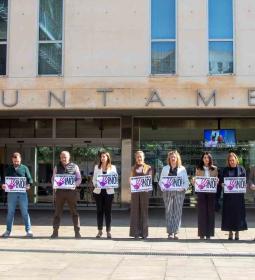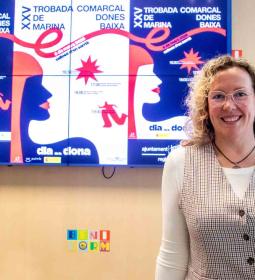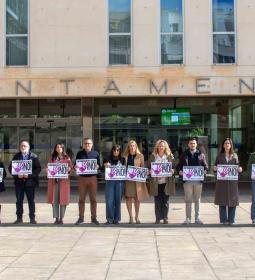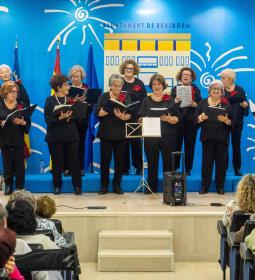Ana Pellicer offers her hand and offers spaces to program campaigns and activities to raise awareness and encourage prevention
Anémona calls for expanding screening so that early detection of breast cancer can reach more women

Anémona Marina Baixa, the Self-Help Group for Women with Breast and Gynecological Cancer in Benidorm and other municipalities in the region, has called for expanding screening so that early detection of breast cancer can reach more women. This has been one of the main demands contained in the Manifesto prepared on the occasion of International Breast Cancer Day 2023, whose reading took place this Thursday afternoon at El Torrejó Municipal Building and was carried out by Asunción Loriente, the president of the Spanish Rowing Federation. The first deputy mayor of the Benidorm City Council and Councilor for Health, Ana Pellicer, supported the women who are part of Anémona together with the councilor for Equality, Ángela Zaragozí, other councilors of the Municipal Corporation and the regional deputies José Ramón González de Zárate and Mario Villar.
The Manifesto prepared by the Spanish Breast Cancer Federation, Fecma, of which 47 federated associations from all over the country are part, including Anémona, has once again drawn attention to the fact that “cancer must be addressed in its entirety.” complexity, with comprehensive care and multidisciplinary criteria, combining prevention, early detection, care response, research, and innovation", also remembering that "population screening programs reduce premature mortality from cancer" and its effects. on the affected people. “The European Union has remembered that cancer detection is a simple and routine health check that could save your life and provides more and better treatment options,” defends the text read in the Torrejó.
However, the Manifesto also warns that “the reference age” for performing ultrasounds on the entire target population “is between 50 and 69 years,” after which it calls for “expanding these age groups of women to have a mammogram.” from 45 to 74 years of age “, as recommended by the European Plan to Fight Cancer, to improve survival figures.
More funding for research; a public, universal, free, and quality health system; and more investment in R&D in the pharmaceutical industry or access to new treatments, such as those related to personalized medicine, were other demands of the women who are part of Anémona.
After reading the Manifesto, the president of Anémona, María Botella, took the floor to remember the work that this group has carried out throughout the year, for more than twenty years, to support other women in the diagnosis and during the disease, while remembering how important it has been to start, 7 years ago, practicing rowing for the members of Anémona.
The first deputy mayor and councilor of Health, Ana Pellicer, was in charge of closing the event with a speech in which she recalled the need to continue investigating and confessed her “admiration for the way of working, the complicity and the selfless dedication” of the women who are part of Anémona, whom she thanked “for taking hours away from being with the family and doing your things to be able to accompany and support other women.” Likewise, Pellicer applauded the sporting challenges that this group of affected women has faced in recent years, stated that Benidorm City Council “will continue to support your work” and, finally, she also issued them a challenge: “I propose that we can work together, as a team, to carry out new activities and campaigns with which to raise awareness and encourage the participation of other women in the early detection campaigns” of this disease, for which it provided “all municipal collaboration and municipal spaces.” to be able to carry them out.
Parallel to this event, Benidorm City Council also illuminated the new catenary on the Paseo Marítimo de Levante and other emblematic places, such as the Castell or the Cross, in pink last night, as a show of solidarity and support for people affected by breast cancer. and their families and to support and advocate for more research to stop it.









